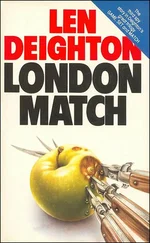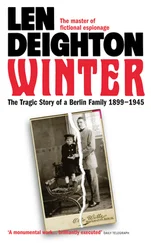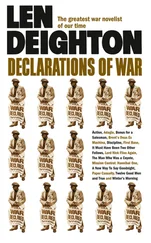Len Deighton - XPD
Здесь есть возможность читать онлайн «Len Deighton - XPD» — ознакомительный отрывок электронной книги совершенно бесплатно, а после прочтения отрывка купить полную версию. В некоторых случаях можно слушать аудио, скачать через торрент в формате fb2 и присутствует краткое содержание. Жанр: Триллер, на английском языке. Описание произведения, (предисловие) а так же отзывы посетителей доступны на портале библиотеки ЛибКат.
- Название:XPD
- Автор:
- Жанр:
- Год:неизвестен
- ISBN:нет данных
- Рейтинг книги:4 / 5. Голосов: 1
-
Избранное:Добавить в избранное
- Отзывы:
-
Ваша оценка:
- 80
- 1
- 2
- 3
- 4
- 5
XPD: краткое содержание, описание и аннотация
Предлагаем к чтению аннотацию, описание, краткое содержание или предисловие (зависит от того, что написал сам автор книги «XPD»). Если вы не нашли необходимую информацию о книге — напишите в комментариях, мы постараемся отыскать её.
XPD — читать онлайн ознакомительный отрывок
Ниже представлен текст книги, разбитый по страницам. Система сохранения места последней прочитанной страницы, позволяет с удобством читать онлайн бесплатно книгу «XPD», без необходимости каждый раз заново искать на чём Вы остановились. Поставьте закладку, и сможете в любой момент перейти на страницу, на которой закончили чтение.
Интервал:
Закладка:
‘Why?’
‘It was a special order of the Führer. He was frightened that the Russians might capture one of us and obtain information about him and the day-to-day life at the headquarters.’
‘You were close to Hitler?’
‘Sometimes I would see him every day. It was in February that the signals officer of Hitler’s private train-the Führersonderzug-went into hospital and I was assigned to it. Of course, there were drawbacks to the job. Every uniform had to be well pressed and spotless. No swearing, no smoking, and my communications staff were overworked.’
‘And whose job was it to look after the records?’
‘One man could not have handled the paperwork,’ said Wever wearily. ‘It’s difficult to explain it to you.’ He folded his handkerchief and pushed it back into his pocket ‘The Führersonderzug was like a travelling circus. The train always carried a dozen aides and adjutants, two or three secretaries and two physicians, as well as a surgeon. Then there would be the press men, Hoffmann, Hitler’s photographer, two or three people from the Foreign Office, and Hitler’s personal staff-three valets and two drivers-a dozen or more railway employees, and just as many catering staff, five railway policemen and three officials of the post office. There were two girls who did nothing other than keep the silver clean and polished and counted! And all that is without his military bodyguard or his SS bodyguard, or the aeroplanes and dozens of motor cars that followed the train to be ready in case Der Chef wanted them en route. Then there was the day-to-day paperwork of the army personnel, flak-gun crews, field kitchen, military police… Can you imagine how much paper was being filed away?’
‘I want to know about Hitler’s personal documents,’ said Stuart. ‘I’m trying to discover where they went in the last days of the war. My people say you know about this.’
Wever gave no sign of having heard him. Dabs of rain hit the window. It was growing darker in the kitchen, but electric light-like remnants of pastry and the last traces of sugar-was carefully husbanded in this household. Franz Wever’s head settled deeper into his hunched shoulders and he almost disappeared into the gloom.
‘I was with Hitler almost until the end.’ Wever drank some tea. ‘On December 10, 1944, at 1700 hours we took the Führer’s special train out of Berlin to a place near Giessen where a convoy of cars took him to Adlerhorst, his headquarters. I was asked to take the place of the signals officer of the FBB-the army escort battalion. He’d been on leave in Berlin on the night of December 9 and was killed in an air raid.’
Wever was still, his eyes closed. In the wretched little kitchen, the daylight fading, he seemed to be asleep. When he spoke again it was enough to make Stuart start in surprise. ‘The train returned to Berlin on January 16, 1945. The Führer was bent and seemed unwell. We arrived about ten o’clock in the morning. The fleet of black three-axle Mercedes cars was waiting in the forecourt of the railway station. A small crowd had gathered but the police were keeping them moving. There were growing fears about another attempt on his life. Now that the Third Reich was nearly finished, there was anti-Nazi talk in the bars and Berliners had invented some bitter jokes about the Nazi leaders taking gold to South America. There had always been anti-Nazi jokes in Berlin -it was renowned for them-but the jokes were different now…
‘Once we were back in Berlin Der Chef spent more and more time down in the underground bunker where he eventually died. The American bombers would arrive just before lunch and the RAF about midnight.
‘For a few days the Führer kept his apartment in the small Old Chancellery building and continued to hold his military conferences in the big new Chancellery which Speer had designed. It had suffered several direct hits but the Führer’s study and dining room were intact. On Wednesday, March 21, when the news was coming in that Patton’s infantry were entering Ludwigshafen, Der Chef sent for me. By that time the tapestries and valuable paintings had been removed for safekeeping and we had to detour through side passages because of the damage. Many of the windows were broken and had been crudely closed off with heavy cardboard which rattled noisily with the wind from the garden. It was depressing for anyone who remembered it as it had once been.
‘I arrived at the entrance together with Colonel General Guderian and his adjutant. They had to go through exactly the same security checks that I was subjected to, and there were armed sentries every ten paces. The whole Zitadelle-the part of Berlin where all the government buildings were-was teeming with troops. A company of the Führer Begleit Batallion was moved out of the Lichterfelde barracks at short notice and put into the Chancellery with the SS Begleit Kommando. It was chaos because the Leibstandarte Adolf Hitler Wache Reichskanzlei was still there with no room to spare.
‘At the end of every corridor my papers were checked against a log-book entry. When we got to the ante-room I took my pistol from its holster and gave it to the Waffen SS guards. There was a table filled with them, each gun tagged with the name of the owner. Even Guderian and his adjutant had to hand over their briefcases for the guards to examine inside and out. There were no body checks but I don’t think anyone with a lumpy uniform would have got into the ante-room.’ Wever smiled.
‘Once inside the ante-room I saw all the big brass waiting for the daily conference. There was Keitel, Donitz, Jodl, some of Himmler’s RSHA people and, sprawled in the armchair looking miserable, I saw Göring himself. I sat down on one of the embroidered gilt chairs feeling out of place, then the study doors opened and Günsche came into the ante-room.’
‘Günsche was Hitler’s adjutant,’ said Stuart to display his newly acquired knowledge. ‘His SS adjutant.’
‘Hitler had dozens of SS adjutants,’ said Wever, showing no admiration for this interjection. ‘Four SS persönliche Adjutanten-it was bureaucracy running wild… ’ He brushed aside the interruption with a movement of the hand and sipped some more tea. ‘But SS Sturmbannfuhrer Günsche was one of them and combat commandant too. At the end it was Günsche who soaked Hitler’s body in petrol and set it afire. He beckoned to me, and told the others-including Göring-that the Führer would receive them in five minutes. They looked at me as I was ushered into the study to see what it was that made me so important. I was trying to guess. As always in this sort of situation it is guilty fears that predominate. I wondered if I was going to be executed for telling some anti-Hitler joke or complaining about the dehydrated cabbage. Everyone had heard me complain about that cabbage.
‘Günsche took me through the enormous study, with the painting of Bismarck and Hitler’s gigantic desk, to a side room where they stored documents of the sort the Führer might require at short notice during his daily conferences. It was a small room and Hitler stood in the middle of it. As I came closer to him I could smell the medicated sweets he used whenever he had a sore throat. He had a pathological fear of contracting a disease of the throat.
‘He was a shocking sight. You must remember that I had seen him often. On the train I would sometimes be giving him teleprinter messages by the dozen. When things were going well, the Führer would exchange a few words. He remembered the names of my parents and my mother’s birthplace- Linz in Austria. Now I could hardly recognize him. His face seemed to have aged forty years, his eye sockets were deeply sunken and the skin of his cheeks dark, as if bruised. He was stooped and seemed to have lost the use of his left arm, which trembled constantly. His voice was very low and hoarse and almost unrecognizable to anyone who had heard his speeches of earlier years-and which of us had not! When he spoke he leaned forward and used his right hand to grasp his throat, as if to help his vocal chords.
Читать дальшеИнтервал:
Закладка:
Похожие книги на «XPD»
Представляем Вашему вниманию похожие книги на «XPD» списком для выбора. Мы отобрали схожую по названию и смыслу литературу в надежде предоставить читателям больше вариантов отыскать новые, интересные, ещё непрочитанные произведения.
Обсуждение, отзывы о книге «XPD» и просто собственные мнения читателей. Оставьте ваши комментарии, напишите, что Вы думаете о произведении, его смысле или главных героях. Укажите что конкретно понравилось, а что нет, и почему Вы так считаете.












